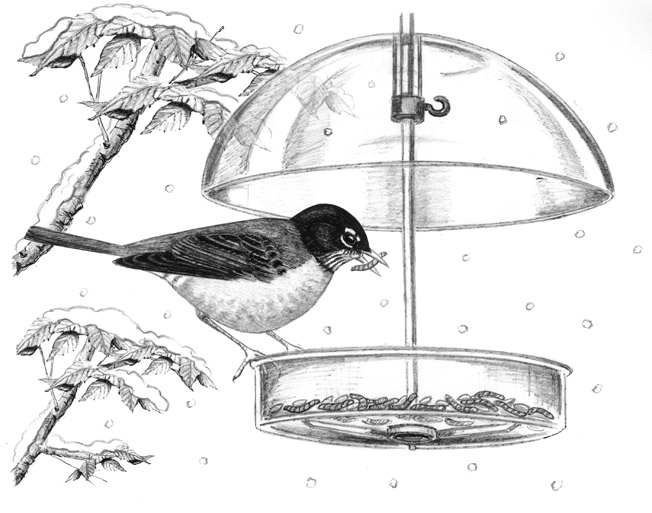
Dear Bird Folks,
I’m worried about a robin that keeps eating sunflower hearts from my feeder. I didn’t think robins ate seeds. Should I be concerned about the digestive health of this poor robin?
– Poppy, Virginia
You could be the first, Poppy,
I’ll have to check the records, but you could be the first “Poppy” who has ever submitted a question, and that’s a problem. Don’t get me wrong; I’m not going to discriminate against you just because you are different. (That’s the job of Arizona’s legislature.) But when I respond to a question I try to have an image of the question-asker in my mind. The image is based solely on the person’s name. For example, if “Madison” writes in, I picture a twenty-something grad student. But if, say, “Phil” sends me a question, I envision a middle-aged guy who hasn’t been to the gym in forever. I’m not saying that my theory is scientific, accurate or in any way fair, but it’s just what I do. However, I have no idea what someone with the name of Poppy might look like. You could be a kindly old grandfather (aren’t a lot of grandfathers called Pop?). Or perhaps you are called Poppy because you are the secret daughter of the late popcorn king, Orville Redenbacher. Maybe I should be picturing you wearing thick glasses and sporting colorful bowties. Yeah, let’s go with that. I think it’s a good look.
If I were to ask folks to make a list of the birds that came to their backyards, just about everyone would include the American Robin. Robins are both abundant and instantly recognizable. But the robins’ interest in our yards isn’t related to our feeders. They are one of the few birds that are truly grateful for those boring lawns some folks are obsessed with. Actually, it’s not the lawns the birds love; it’s the worms the lawns provide. Lawns are worm goldmines, especially after it rains. When I was a kid I had a morning paper route. If it had rained the night before, I would find tons of worms crawling in the street. I tried to rescue the stranded worms by picking them up off the pavement and placing them back on the grass. (Even at a young age I was a card-carrying tree hugger.) The worms loved me, but the hungry robins didn’t. (Neither did my customers. Many of them ended up with newspapers covered in worm slime.)
When snow and cold put an end to the summer’s worm-fest, scores of robins not only migrate south, but they change their diet. The birds switch from slurping down worms to eating fruit (a much more appealing option if you ask me). Robins readily eat the berries of holly, sumac, chokecherry and juniper. Eating fruit allows the birds to remain farther north when it’s cold. The thought of seeing robins in the winter is surprising to many people, but wintering robins are actually more common than most of us think. In fact, every state, except Hawaii (which is just too darn expensive), has at least some robins year-round. In the winter, robins avoid our frozen lawns and instead form large roving flocks. The flocks spend the day searching for berries in nearby woodlands. But if it’s a particularly tough winter and the woodland food becomes depleted or encased in snow, the birds are forced to seek alternative sources, which, in some cases, are our bird feeders.
This winter lots of customers have told me about robins at their feeders. Sometimes the robins arrive in a flock, but more often it’s a single, rather bossy bird that comes to a feeder. A lone robin can claim a feeder for its own and will attack any other bird that comes near. If this happens in your yard, the easiest thing to do is nothing. I say, just let the birds work things out for themselves. However, many people don’t like this plan of inaction. They feel the need to intervene and make sure every bird gets a fair shake. I think we all know people like this, the types who run out in the yard, waving their arms like a crazy person, trying to be the feeder police. Instead of waving, these folks should simply put out a second feeder, further away. One robin can’t control two feeders. You could also try spreading some seed on the ground. Since robins seem to enjoy eating on the ground, the bossy bird is likely to focus on terra firma and leave your feeder unguarded. But honestly, I think the crazy arm waving is much more entertaining.
As you pointed out, robins will readily take sunflower hearts (hulled sunflower). But I’ve also had reports of them eating suet, water-softened raisins and mealworms. (Unfortunately, no one seems to think they’ll eat popcorn. Sorry, Poppy.) I even had one customer who prepared fresh spaghetti for her robins. (Yes, you read that right.) She boiled spaghetti (hopefully, al dente), cut it up in “worm-sized” pieces and then stirred in sauce. She placed it all on a plate outside and, according to her, the robins loved it. She didn’t say if she also added a slice of garlic bread and spread out a red and white checkered tablecloth, but I can only assume she did.
I wouldn’t worry too much about your robin’s digestive health, Poppy. Robins are extremely adaptable birds. They wouldn’t be nearly as common if they had fussy tummies. As soon as this endless polar vortex calms down and things warm up a little, your robin will likely go back to eating more natural food and your other birds can have their feeder back. In the meantime, just enjoy your new feeder bird. And if you decide to offer your robin a plate of fresh spaghetti, let me know. I’ll be over with a fork, a napkin and some Parmesan cheese, just to make sure you’ve cooked it right.